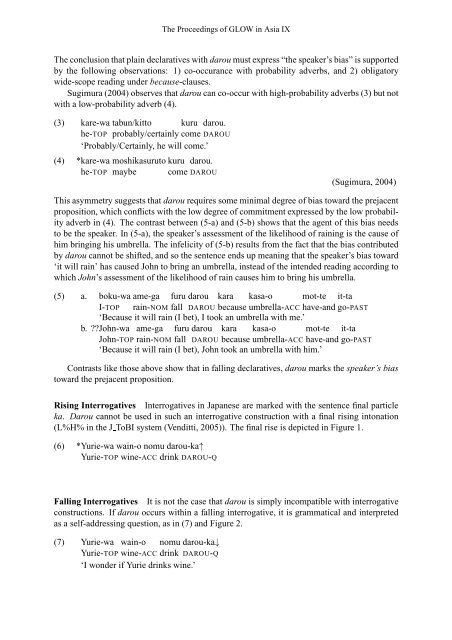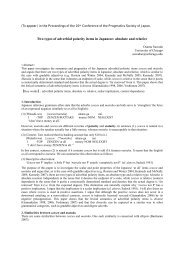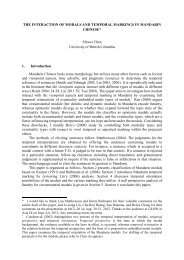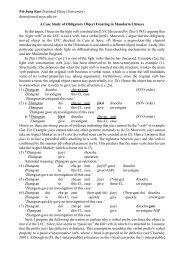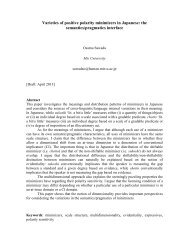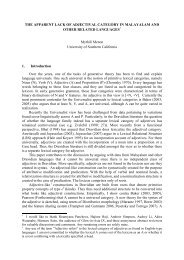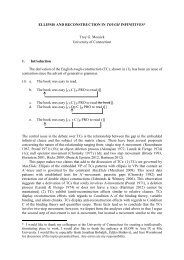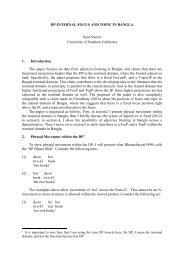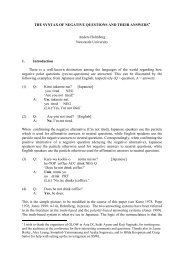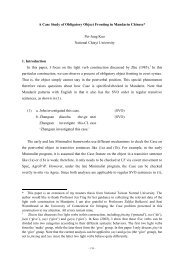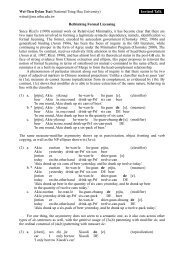On the Interaction Among Sentence Types, Bias, and Intonation
On the Interaction Among Sentence Types, Bias, and Intonation
On the Interaction Among Sentence Types, Bias, and Intonation
You also want an ePaper? Increase the reach of your titles
YUMPU automatically turns print PDFs into web optimized ePapers that Google loves.
The Proceedings of GLOW in Asia IX<br />
The conclusion that plain declaratives with darou must express “<strong>the</strong> speaker’s bias” is supported<br />
by <strong>the</strong> following observations: 1) co-occurance with probability adverbs, <strong>and</strong> 2) obligatory<br />
wide-scope reading under because-clauses.<br />
Sugimura (2004) observes that darou can co-occur with high-probability adverbs (3) but not<br />
with a low-probability adverb (4).<br />
(3) kare-wa tabun/kitto kuru darou.<br />
he-TOP probably/certainly come<br />
‘Probably/Certainly, he will come.’<br />
(4) *kare-wa<br />
he-TOP<br />
moshikasuruto<br />
maybe<br />
DAROU<br />
kuru darou.<br />
come DAROU<br />
(Sugimura, 2004)<br />
This asymmetry suggests that darou requires some minimal degree of bias toward <strong>the</strong> prejacent<br />
proposition, which conflicts with <strong>the</strong> low degree of commitment expressed by <strong>the</strong> low probability<br />
adverb in (4). The contrast between (5-a) <strong>and</strong> (5-b) shows that <strong>the</strong> agent of this bias needs<br />
to be <strong>the</strong> speaker. In (5-a), <strong>the</strong> speaker’s assessment of <strong>the</strong> likelihood of raining is <strong>the</strong> cause of<br />
him bringing his umbrella. The infelicity of (5-b) results from <strong>the</strong> fact that <strong>the</strong> bias contributed<br />
by darou cannot be shifted, <strong>and</strong> so <strong>the</strong> sentence ends up meaning that <strong>the</strong> speaker’s bias toward<br />
‘it will rain’ has caused John to bring an umbrella, instead of <strong>the</strong> intended reading according to<br />
which John’s assessment of <strong>the</strong> likelihood of rain causes him to bring his umbrella.<br />
(5) a. boku-wa ame-ga furu darou kara kasa-o mot-te it-ta<br />
I-TOP rain-NOM fall DAROU because umbrella-ACC have-<strong>and</strong><br />
‘Because it will rain (I bet), I took an umbrella with me.’<br />
b. John-wa ame-ga furu darou kara kasa-o mot-te it-ta<br />
John-TOP rain-NOM fall DAROU because umbrella-ACC have-<strong>and</strong><br />
‘Because it will rain (I bet), John took an umbrella with him.’<br />
go-PAST<br />
go-PAST<br />
Contrasts like those above show that in falling declaratives, darou marks <strong>the</strong> speaker’s bias<br />
toward <strong>the</strong> prejacent proposition.<br />
Rising Interrogatives Interrogatives in Japanese are marked with <strong>the</strong> sentence final particle<br />
ka. Darou cannot be used in such an interrogative construction with a final rising intonation<br />
(L%H% in <strong>the</strong> J ToBI system (Venditti, 2005)). The final rise is depicted in Figure 1.<br />
(6) *Yurie-wa wain-o nomu darou-ka↑<br />
Yurie-TOP wine-ACC drink DAROU-Q<br />
Falling Interrogatives It is not <strong>the</strong> case that darou is simply incompatible with interrogative<br />
constructions. If darou occurs within a falling interrogative, it is grammatical <strong>and</strong> interpreted<br />
as a self-addressing question, as in (7) <strong>and</strong> Figure 2.<br />
(7) Yurie-wa wain-o nomu darou-ka↓<br />
Yurie-TOP wine-ACC drink DAROU-Q<br />
‘I wonder if Yurie drinks wine.’


